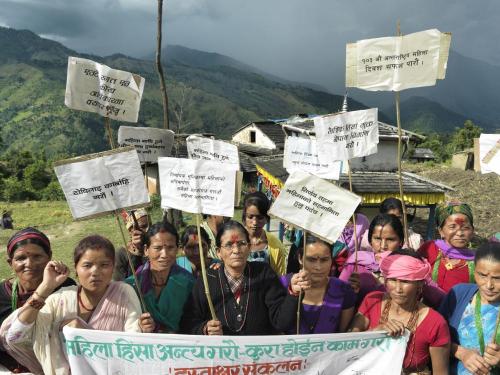
Worldwide women suffer disproportionately from poverty, making up almost two thirds of people living in extreme poverty. Despite performing two thirds of the world’s work and producing 50% of the food women earn only 10% of the income, and own only 1% of the property. In addition to this the number of women in positions of power able to influence this imbalance is minimal. Just 13 out of 193 heads of government are women. Only one in five parliamentarians is a woman. Women hold just 17% of ministerial positions around the world. At the current rate of progress VSO estimates it will take 120 years before women make up half of the worlds leaders and over 50 years until women are equally represented in parliaments.
I listened to a speech recently by Kavita Ramdas. She used the analogy of cooking a rice cake in explaining why women’s presence at the top is needed:
“How do you cook a rice cake, from heat from the bottom or heat from the top?’ The protest the marches, the uncompromising position that women’s rights are human rights full stop part the heat from the bottom, but you also need the heat from the top. In most parts of the world that top is still controlled by men. To paraphrase Marx women may change, but not in ‘circumstances of their own choosing’.
I believe women’s equal access and influence over decision making in public and politicallife is critical. Not only as it is a fundamental right, but because women suffer disproportionately through poverty any effort to address this and build sustainable communities therefore needs to meaningfully involve those who are most affected by it, i.e. women.
In 2000 the UN member states agreed eight Millennium Development Goals (MDG) to achieve by 2015.
- Eradication of extreme poverty.
- Universal access to primary education.
- Promote gender equality and the empowerment of women.
- Reduction of child mortality.
- Improved maternal health
- Combat HIV and AIDS.
- Environmental sustainability.
- The establishment of a global partnership for development.
With the MDG ending in 2015 focus is being placed on developing new post-millennium development goals (PMDG). Unlike the MDG the PMDG will provide focus to all countries; developed and developing. Although not perfect the MDG were a successful tool for focusing development efforts and money where they were most needed. The PMDG will focus political ambition and money. VSO are campaigning for a stand alone goal for women’s empowerment and gender equality with a specific target to: ‘Eliminate discrimination against, and increase the participation and influence of, women at all levels of public and political life.’
While significant progress has been made towards women’s empowerment in the past few decades, equality is still a long way off. Kavita Ramdas sums up some of the challenges that sets feminism apart from other social movements:
“Feminism, unlike any other social movement is not a struggle against a distinct oppressor, it is not the ruling class, or the occupiers, or the colonizers it is against a deeply held set of beliefs and assumptions that we as women far to often hold ourselves”
Patriarchal societies and social norms that focus women’s roles on care and domestic work, and inflexible decision making institutions are all structural barriers that stop women from participating in and influencing decision making.
Often it is the patriarchal cultures and social norms that prevent equality, creating a more subtle and hidden form of discrimination that if not challenged can almost go unnoticed. A stand alone goal focused on micro planning as opposed to a one fits all approach can help to address some of these subtle norms.
A concrete target on women’s participation and influence and indicators that measure women’s participation in quantitative and qualitative ways is needed.
This Saturday 8th March is International Women’s Day and this will be used as a platform for lobbying for a stand alone goal for gender equality. Please join VSO in taking action on this campaign.










Add new comment